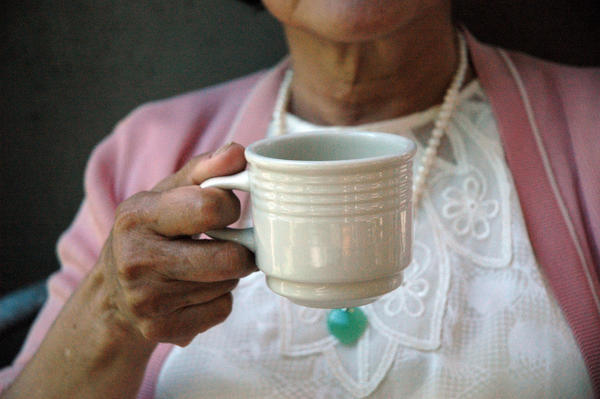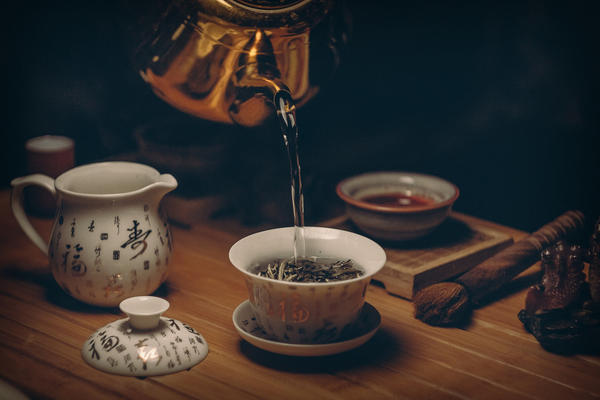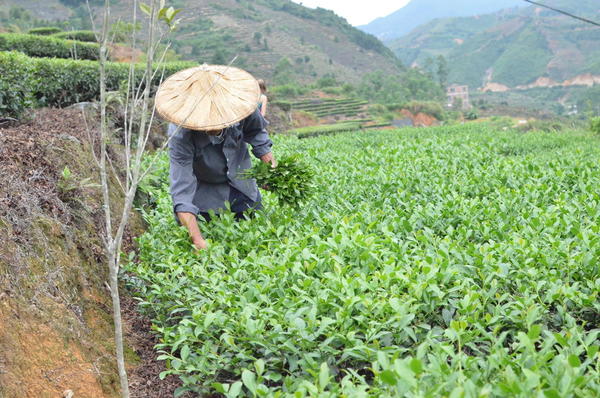Tea and Mindfulness
Wikipedia: MindfulnessLast Updated: Oct. 24, 2018
 Photo © Wonderlane, CC BY 2.0.
Photo © Wonderlane, CC BY 2.0.This article gives an overview of each of these facets of the relationship between tea and mindfulness.
Health benefits of mindfulness
Mindfulness has been consistently shown to be associated with lower risk of mental disorder and better psychological health.Dispositional mindfulness, which can be defined as awareness of our thoughts and feelings in the present moment, has been shown in numerous studies to be associated with reduced depression symptoms, more empowering cognitive processes, and better regulation of emotions.[1] These results are good news, because dispositional mindfulness represents a set of skills that can be trained, cultivated, or improved.
In spite of limitations on research, the evidence in support of the benefits of mindfulness is significant, coming from correlational studies, clinical interventions, and laboratory-based, experimental studies. These results have been known for some time, with much of the research having been carried out in the mid-2000's or earlier.[2]
 The ritual of brewing or preparing tea has ample opportunities for mindfulness exercises. Photo © toolstotal.com, CC BY 2.0.
The ritual of brewing or preparing tea has ample opportunities for mindfulness exercises. Photo © toolstotal.com, CC BY 2.0.Tea as a mindfulness aid
Tea, including both the act of preparing it, and of drinking it, provides an easy and natural focal-point for mindfulness activities. Perhaps owing in part to the long history of tea in Eastern cultures where meditation plays more prominently, numerous authors have written about how to approach tea mindfully.Ed Halliwell, a UK-based mindfulness teacher, has specifically written about how to be mindful with a cup of tea. This guide focuses on the entire process, from preparation and brewing to drinking, and uses it as an example of an exercise that can be applied to many other activities.
A slightly more abstract and Buddhist-influenced exercise is given by Joseph Emet of the mindfulness meditation centre, in how to drink a mindful cup of tea. This exercise uses Thich Nhat Hanh's tea breaks as an example, and focuses on "interbeing", a concept related to the interconnectedness of the different elements of the universe. It also focuses on enjoyment of the tea.
Mindfulness to boost your appreciation of tea
The relationship between mindfulness and tea also runs in the other direction: being mindful in your approach to tea can enhance your appreciation of tea. These two facets of tea and mindfulness often go hand-in-hand: as you use tea drinking as an exercise in bringing yourself to focus on the present moment, you begin to appreciate the tea more. Early Harvest of Leaves for Tie Guan Yin, Long Juan, Anxi, China, Photo © Dylan Conroy, Copyright, All Rights Reserved
Early Harvest of Leaves for Tie Guan Yin, Long Juan, Anxi, China, Photo © Dylan Conroy, Copyright, All Rights ReservedThere can be a spiritual component to this awareness, much as with the example of the awareness of the interconnectedness of the universe during meditation: as people begin to focus more on small-batch, single-harvest teas, people develop an increased awareness of and connection to the people and regions that grow the tea.
RateTea and mindfulness
To aid people on this journey to become more aware of the nuances and origins of tea, teas on our our site are classified by style (type or variety of production method) and region of production, and you can both browse teas and reviews in each category, as well as read articles and see pictures of the various places tea is grown and the various methods of harvesting and processing it. You will also notice that, unlike most social media, our site lacks pop-up notifications, self-updating feeds, and other attention-demanding features.These design choices are intentional; we want our site to promote a mindful way of using the internet, and of living in general. We don't want you to spend hours staring at a screen: we want you to use our site briefly as a reference, to learn about tea, keep track of teas you like, and share your feelings about tea. But we want your focus to be out in the world, on the tea itself.
We hope that through gently guiding people to become more mindful in their tea drinking, we can also encourage people to become more mindful in how they approach food and drink in general, and all aspects of their lives.
References
1. Eve R. Tomlinson et. al, Dispositional Mindfulness and Psychological Health: a Systematic Review, Mindfulness (N Y), Vol. 9, No. 1, 2018; pp. 23–43.
2. Shian-Ling Keng et. al., Effects of Mindfulness on Psychological Health: A Review of Empirical Studies, Clinical Psychology Review, Vol. 31, No. 6, Aug. 2011; pp. 1041–1056.

